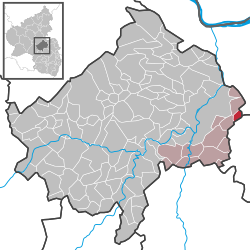Pleitersheim
| Pleitersheim | ||
|---|---|---|
|
||
| Coordinates: 49°50′12.34″N 7°57′10.87″E / 49.8367611°N 7.9530194°ECoordinates: 49°50′12.34″N 7°57′10.87″E / 49.8367611°N 7.9530194°E | ||
| Country | Germany | |
| State | Rhineland-Palatinate | |
| District | Bad Kreuznach | |
| Municipal assoc. | Bad Kreuznach | |
| Government | ||
| • Mayor | Rudi Graffe (SPD) | |
| Area | ||
| • Total | 2.32 km2 (0.90 sq mi) | |
| Elevation | 129 m (423 ft) | |
| Population (2015-12-31) | ||
| • Total | 320 | |
| • Density | 140/km2 (360/sq mi) | |
| Time zone | CET/CEST (UTC+1/+2) | |
| Postal codes | 55576 | |
| Dialling codes | 06701 | |
| Vehicle registration | KH | |
| Website | www.pleitersheim.de | |
Pleitersheim is an Ortsgemeinde – a municipality belonging to a Verbandsgemeinde, a kind of collective municipality – in the Bad Kreuznach district in Rhineland-Palatinate, Germany. It belongs to the Verbandsgemeinde of Bad Kreuznach, whose seat is in the like-named town, although this lies outside the Verbandsgemeinde. Pleitersheim is a winegrowing village.
Pleitersheim lies in the heart of Rhenish Hesse some 7 km east of downtown Bad Kreuznach on ground that slopes gently southeastwards to the Karlebach, a left-bank tributary to the Appelbach. The outlying countryside is barely wooded at all and is grouped with the Wöllsteiner Hügelland (“hill land”), which hosts intensive agricultural use. Pleitersheim borders on two neighbouring districts, Mainz-Bingen and Alzey-Worms.
Clockwise from the north, Pleitersheim’s neighbours are Pfaffen-Schwabenheim (likewise in the Bad Kreuznach district), Badenheim (in the Mainz-Bingen district), Wöllstein (in the Alzey-Worms district) and Volxheim (also in the Bad Kreuznach district). Although the town and district seat of Bad Kreuznach lies right nearby, Pleitersheim does not border directly on it.
Pleitersheim, whose name is interpreted as “Blithen’s Home” – it may well have been named after a Frankish nobleman – can rightly look back on 1,200 years of existence since the nobleman in question came here with his entourage and servants. As with so many other villages in the region, Pleitersheim had its first documentary mention in monastic landhold directories. While the monks from Lorsch Abbey had landholds here as early as the 8th century – one source mentions the more specific date of 781 for the first documentary mention – Pleitersheim later belonged to the Lordship of Wöllstein. The monks enfeoffed the Raugraves with landholds and the court that had formerly been held by the Lordship of Wöllstein. Besides this comital family, the Rhinegraves, too, had landholds in the village quite early on. More decisive to the village’s fate were the Raugraves, who held a castle in the village, and whose policies of pledging and selling off landholds in the 14th century also affected Pleitersheim. Owing to acquisitions in the 14th century, half the village belonged to the Counts of Sponheim and then, after they died out, to the heirs, the Electorate of the Palatinate, the Margraviate of Baden and Veldenz-Zweibrücken. In 1601, every one of the 22 hearths (for which read “households”) in the village belonged to Sponheim subjects. Only two persons were subject to the County of Wöllstein. In the 19th century, Pleitersheim – and likewise Tiefenthal – did not undergo any great growth in population as was observed everywhere else in the region. In 1846, there were 286 people living in the little village, more than at any other time in its history to this point. Thereafter, this figure began to shrink, until in 1939 it had bottomed out at 142 inhabitants. By 1950, though, this had risen back up to 215 inhabitants, but even so, a downward trend was once again seen over the years, with the population figure reaching 183 in 1980. The low population figure notwithstanding, there were enough interested people in the village in 1875 for a singing club to be founded. A few years later came the volunteer fire brigade. In 1911, Pleitersheim got electricity, which began to be transmitted to the village from Worms, but a watermain was not laid until 1950. Sewerage came even later, in 1973. The two world wars did not leave even a small village like Pleitersheim unscathed. In the First World War, seven citizens of the municipality lost their lives, while in the Second World War, 15 soldiers from the village did not come back.
...
Wikipedia



